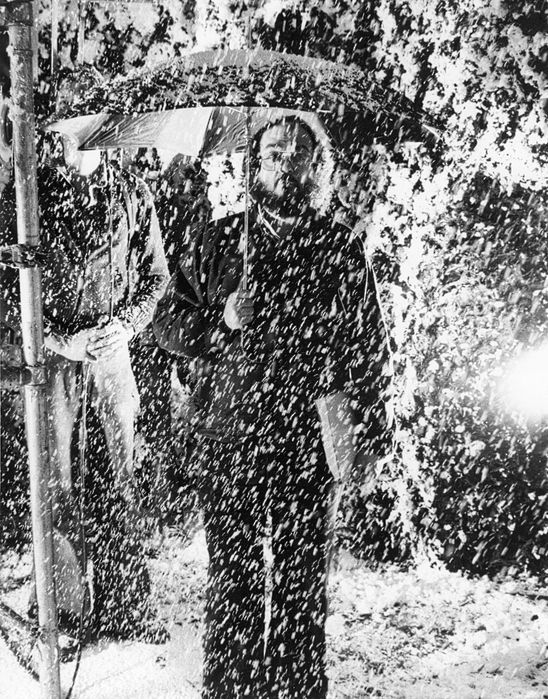WHAT IS THE BEST APPROACH TO HANDLING NORTH KOREA’S BELLICOSITY: THE CARROT OR THE STICK? TWO WSJ ARTICLES EXPLORE
By DAN VALENTI
PLANET VALENTI News and Commentary
(FORTRESS OF SOLITUDE, MONDAY, APRIL 29, 2013) — Now that the Boston Marathon finish line is thankfully no longer the most photographed piece of real estate in the US, there is no hotter spot on the planet right now than the Korean peninsula, particularly at the 38th parallel. Today on THE PLANET, it becomes hot as well.
It’s amazing how the events in Boston have knocked the situation in Korea out of the public’s eye. We will do our part by re-introducing this as a topic, because, perhaps short of a Mid-East flash point, the situation on the Korean peninsula is probably the likeliest point from which Armageddon would be launched.
Ratcheting Up the Bellicosity
As the white-walled Kim Jong-un, the 30-year-old clowntator (a word we just coined for a dictator who’s an idiot; not all of them are, you know), has ratcheted up the bellicosity and tension on the peninsula, the Obama Administration has ratcheted down its response, preferring a “stabiity through dialogue” policy. Is that the right approach, or is a more strident show of force necessary to once and for all put the hermit country in its place, force a change of leadership, and escot the hermit out of the cave into the sunlight?
It’s a huge policy questions with enormous geopolitical implications. Today, we present both sides of this issue, in two excellent pieces published recently in the Wall Street Journal. Please read and tell us what you think the U.S. response to North Korea should be: carrot or stick.
—— 00 —–
STICK — THE CASE FOR MORE ASSERTIVE ACTION BY SUE MI TERRY
The only surprise in the threatening behavior of North Korea is that Americans are so surprised when the North again foments trouble. They wonder if leader Kim Jong-un, like his father, is “crazy.”
But he is simply acting in a way that brings the results he expects from a successful pattern of global extortion. It begins with threats, moves to negotiations, results in economic and political benefits for the North, and is then repeated after Pyongyang spurns agreements.
THE MONITOR’S VIEW: Can hope replace North Korea’s fears?
The way out of this conundrum is for the United States to try a more assertive stance that gives the US the initiative and puts the North on its heels – for instance, by sending Pyongyang a clear warning of preemptive action if America and its allies find themselves threatened.
Of course, putting North Korea on the defensive won’t in and of itself mothball the country’s nuclear program or bring a lasting peace to the Korean Peninsula. But it will put the US in a much stronger position to pursue those objectives.
The latest military precautions by Washington are useful to a degree. Welcome, too, are reports that the US and South Korea will respond “in kind” to any military provocations from the North. Still, because these are reactive, proportionate steps, they won’t go far enough to change Pyongyang’s behavior.
Mr. Kim’s ratcheting up of tensions should convince the US and South Korea that the new leader has the same goals as his father, Kim Jong-il, and will repeat the cycle of threats. The young Kim, like his predecessor, wants to show strength and independence of action despite an economic dependency on neighbors. He wants to prove to the ruling clique his determination to stand up to adversaries.
The 30-year-old Kim probably learned from his father that bilateral talks with Washington hold immeasurable value: implicit US recognition and acceptance as a nuclear power, showing to all Koreans he is the key leader determining the future of the peninsula with a superpower. Meanwhile, South Korea is relegated to the position of a second-tier actor.
These selfish motives show that the North’s political and military leadership is fundamentally disinterested in normal relations with the US. Indeed, they fear that normalization and opening up would spell the regime’s end.
Successive US administrations have taken the high road, probing for mutual concessions to bolster stability on the peninsula. True, this approach has helped maintain a tenuous peace. It has given the US some access to an obscure regime and allowed the US to address difficult foreign policy problems elsewhere.
But unfortunately, past negotiations have done little more than temporarily constrain Pyongyang’s provocations, and the downsides of talks have become more apparent in recent years.
Since Washington puts such a premium on stability through dialogue, its words of warning over time have lost their force and may even signal weakness to Pyongyang. Moreover, with every crisis, Washington seems much more concerned about containing the South Korean response while publicly calling for dialogue with the North. The North’s leaders have taken notice.
And it gets worse. North Korea has taken advantage of America’s altruism in negotiations to extract aid and de facto political recognition, while systematically ignoring or violating the terms of agreements.
To put an end to this, and to bring real stability to the peninsula, the US should find ways to tell Kim privately in clear and unmistakable terms that now things are different, given the North’s claim that it will no longer abide by the armistice that halted the Korean War 60 years ago, and that it is at war with South Korea.
The message should also indicate that the US will defend itself and its allies even to the point of taking preemptive action against military moves it finds threatening – for instance, to disrupt North Korean preparations for short- or long-range missile launches or submarine operations that look to be targeted against US or South Korean forces, or even the US homeland. Washington should demonstrate its commitment to follow through, for example, by conducting close-in air and naval patrols, including overflights of the North. America has never undertaken the types of aggressive reconnaissance against the North that it routinely did against the Soviet Union.
If the US shows resolve, it will get the North’s attention and put it on the defensive. That’s what happened in August 1976. President Ford took the unusual step of placing US military forces on high alert in the region in response to the North’s murder of two US Army officers in the demilitarized zone separating North and South Korea. Pyongyang quickly backed down.
Such a US diplomatic shift would probably shock North Korea’s main ally and benefactor, China, into action and get it to move against the North in ways that American diplomatic imploring has failed to do so far. In addition, South Korea and Japan would gain renewed confidence in the US security commitment, and other countries in Asia would view Washington as a credible partner at a time they fear Chinese military assertiveness in the region.
A tougher approach is not risk free. Kim Jong-un might believe Washington is bluffing, overplay his hand in response, and start a shooting war inadvertently or otherwise.
The US must accept these short-term risks and be prepared to respond forcefully if it ever hopes to end the cycle of provocative behavior and promote long-term stability on the Korean Peninsula.
OPINION: North Korea threatens US – what about its own people?
There is nothing North Korean leaders fear more than a US that turns its full gaze on them with the intent of possibly doing harm. When the US invaded Iraq in 2003, after identifying it along with Iranand North Korea as an “axis of evil,” Kim Jong-il disappeared in hiding for nearly two months.
Washington must now remember this lesson.
The author is a former CIA intelligence officer who specialized in the Korean Peninsula and China for more than a decade.
—– 00 —–
THE CASE FOR THE CARROT BY J. MICHAEL COLE
After nearly two decades of cyclical delinquency, it is high time that the international community stops playing North Korea’s game and explore alternatives to resolve its belligerence once and for all. The current approach has failed, and the longer it is maintained, the closer it will take the region to the brink of war.
The key to changing Pyongyang’s attitude isn’t more sanctions or the deployment of more US troops within the region. While such actions can act as a deterrent against North Korea, they only postpone – and in fact render less likely – the resolution of the conflict and its underlying causes.
What is required, and what only Washington can do, given Pyongyang’s fixation with the US and the presence of its troops inSouth Korea, is a new, creative approach that focuses on substantial US investment to help North Korea rebuild its economy. This shift would remove the nuclear issue as a legitimizing component of the regime in Pyongyang and neutralize nuclear blackmail as a means for the North to win concessions from the international community.
ANOTHER VIEW: To break the cycle of North Korea threats, US must put Kim on his heels (+video)
South Korea attempted to do this with its “sunshine policy,” but that ultimately failed because it did not address the issue of US deployments in South Korea. The only bilateral mechanism that truly matters to Pyongyang is with Washington; everything else, even its relations with Beijing and Seoul, is secondary.
Meeting threats with threats only feeds the national paranoia in North Korea and gives the regime the rationale for redirecting even more resources away from an already destitute people toward the military.
Further, it reinforces Pyongyang’s argument that the principal factor hampering peaceful development is the longstanding US military presence in the region. The North’s insistence on splitting the US-South Korea alliance endures because the North has nothing else to focus on, nothing that appeals as much to the national psyche of victimization.
The time has therefore come to throw Pyongyang a curve ball and to create new opportunities.
The transition of power in Pyongyang following Kim Jong-il’s death in December 2011 and the succession of his son, Kim Jong-un, provides such an opportunity. While little is known about the secretive new leader, we know that his father’s 17 years as “dear leader” were a complete failure. In fact, the elder Kim’s only accomplishment was a fledging nuclear program.
His failures stand out when contrasted with decades of relative success and stability under his father and North Korea’s founder, Kim Il-sung. But Kim-the-second used the state propaganda apparatus and national paranoia to turn his nuclear ambitions into an instrument of legitimacy for his rule.
It is hardly surprising, therefore, that US insistence that Pyongyang abandon its nuclear program before direct talks could resume was met with failure, leading to where we are today.
But what about the younger Kim? A nuclear program alone will not suffice to ensure his support among North Koreans. That is his father’s legacy. Having few other options short of sparking a war of annihilation, the new leader might therefore be tempted to turn to the glory days of the North’s past for inspiration and as a source of legitimacy. North Koreans cried openly when Kim Il-sung passed away; when Kim Jong-il died, the outpourings of grief were fake, an orchestrated affair. It is hard to imagine that the young Kim isn’t aware of this.
A new strategy to deal with North Korea would seek to exploit Pyongyang’s pride, or rather, its need to be proud. It wants recognition, and above all it wants to show the world that its model, too, can be successful. To understand the North’s need to impress, one need only look at the multibillion-dollar (mostly unfinished) infrastructure projects it launched in the 1980s after the International Olympic Committee announced that Seoul would host the 1988 Summer Olympics.
OPINION: West must try a ‘third way’ to change North Korea
Washington could start its new approach by shelving the nuclear issue for the time being, and instead engaging Pyongyang at other levels. This could include exploring ways to help the North rebuild its economy and modernize its industries, or offering it assistance in extracting the rich mineral assets that lie in its soil.
Anything that plays into the national psyche of juche, or “self-sufficiency,” would help dispel the national sentiment of being embattled – certainly more so than sending B-2 bombers and warships to the region.Juche is also why foreign aid, such as food donations, haven’t succeeded in breaking the impasse, as they remain symbols of North Korean subservience to external forces.
Above all, the new aid and investment proposed here must help North Koreans help themselves. And it must be much more far-reaching than the South Korean-funded experiment with the KaesongIndustrial Park, a collaboration located in North Korea. This week North Korea pulled 50,000 of its workers from the park’s factories, essentially shutting it down.
There is no guarantee that this stepped-up engagement would succeed, and at this point it is impossible to know whether the young Kim would be amenable to such an approach. But it’s worth trying, as it would offer both a way out and an alternative that could provide the legitimacy that Kim needs to remain in power. The international community cannot afford military blackmail and the brandishing of weapons of mass destruction to remain the only instruments for Kim to use to stay in power.
The young Kim can be led in this new direction, toward his country’s past glory and away from doomsday weapons. One way to achieve this would be for President Obama to propose a summit, with no preconditions, which would include discussing the possibility of such assistance. For security reasons, such a meeting probably would have to be held in a third country – perhaps China.
Using such a summit as a starting point, Washington could also propose a grand bargain under which, as Pyongyang reduces its threat posture, the US would respond in kind by gradually removing its forces based in South Korea, or basing them in parts of Asia further away from the peninsula. There might be reversals along the way, but it would nevertheless create the self-reinforcing de-escalatory dynamics that are necessary to break the impasse and end the vicious circle.
The regime in Pyongyang needs to be weaned off its addiction to ballistic missiles and nuclear weapons, and encouraged to try another form of nourishment. Incentives that promise to restore some of the North’s past glory and help reduce its external dependencies would be hard for Kim to ignore, and if successful, would help bolster the legitimacy of his rule with his people.
But Washington must make the first move in that direction, with South Korea, China, and Japanplaying a supporting role. Pyongyang doesn’t want to feel boxed in, and the US won’t pull its troops until the North stops threatening the neighborhood. A new model is needed. Creating the proper incentives for Kim Jong-un, giving him an alternative for his legitimacy, is the only way out.
THE MONITOR’S VIEW: Can hope replace North Korea’s fears?
Unless he is a suicidal maniac, Kim will also want to leave a legacy, and he has two examples before him – his father’s complete failure, and the relative successes of his grandfather. Forcing him to choose which example he wants to follow is the way ahead.
J. Michael Cole is a Taiwan-based contributor to Jane’s Defence Weekly and The Diplomat, and deputy news chief at the Taipei Times.
——————————————–
So which should it be, the carrot or the stick? THE PLANET welcomes your thoughts in this most important international issue.
———————————————————————————–
“Love guards the roses of thy lips / And flies about them like a bee; / If I approach, he forward skips, / And if I kiss he stingeth me.” — Thomas Lodge (1556-1625)
“OPEN THE WINDOW, AUNT MILLIE.”
LOVE TO ALL.















I have one word for kim…. meh!
Now… about Syria…
Russia worries me more than Jong.
China backed North Korea the last time. No guarantee they would not at least supply them with late technology weaponry if things flared up again.
Dan,
North Korea’s bellicosity strikes me as noting more than a temper tantrum, and an excuse for it to show off its military hardware to countries like Iran and Syria. North Korea is desperate for cash, and these parades are really sales pitches by the military to try to sell its wares. Obama seems to be striking the right balance at the moment.
But, as evidenced by the lack of responses to this topic, people in this area appear to care far more about the accounting practices of Barry Clairmont or the histrionics of Terry Kinnas then about the geopolitical ramifications of North Korea’s saber-rattling. Indeed, I doubt many could even name the capital of North Korea.
Of course we care more about local politics,they affect us more. There is not much we can to about the man with the little pee pee in Pyongyang.
Pyongyang!!! Nothing like About 275,000,000 results (0.39 seconds) thank you google! There should be no stupid people in the world with the advancements of search engines. Massive databases of information.
McArthers solution would have worked, although we would have to have Nuked, the Koreans, and/or the Red Chinese, when they still were weak.
Truman let us down.
Now we have a wacko state , and a giant just over the border.
Thanks Harry
I disagree that Truman let us down/ McArthur and Le May wanted nukes, and you know what. China had the hydrogen bomb by then. This would have led to all out nuclear war. Truman saved us.
I also like the way DV handled this issue. It’s a huge issue and it affects us more than local politics. Life and death here.
REDACTED